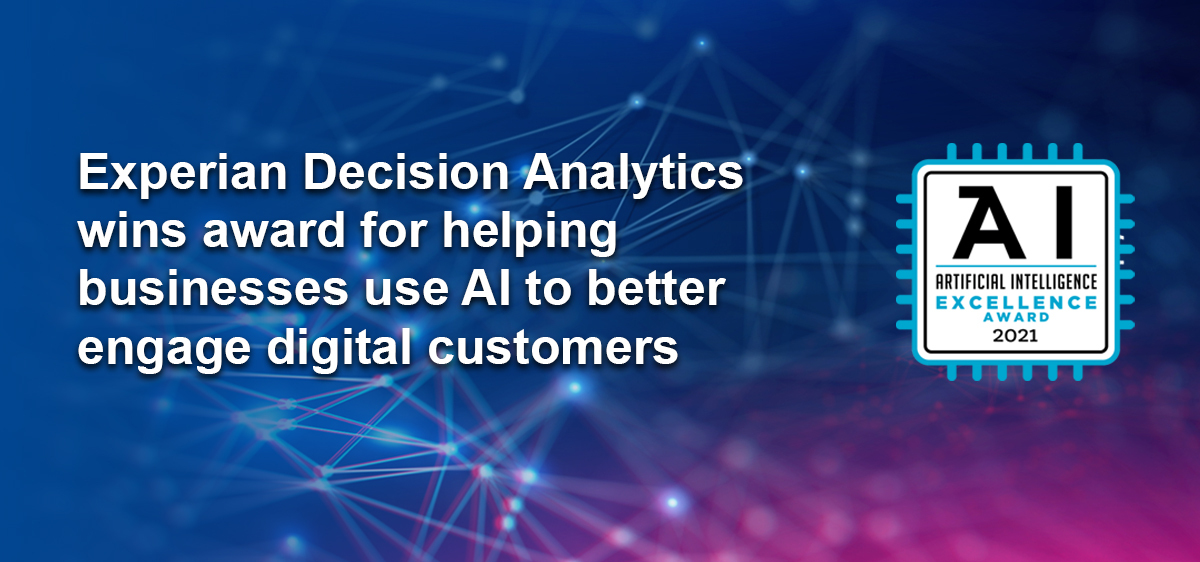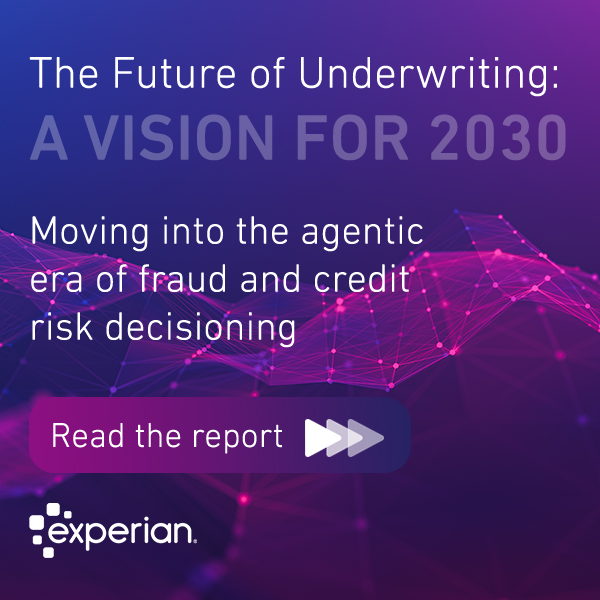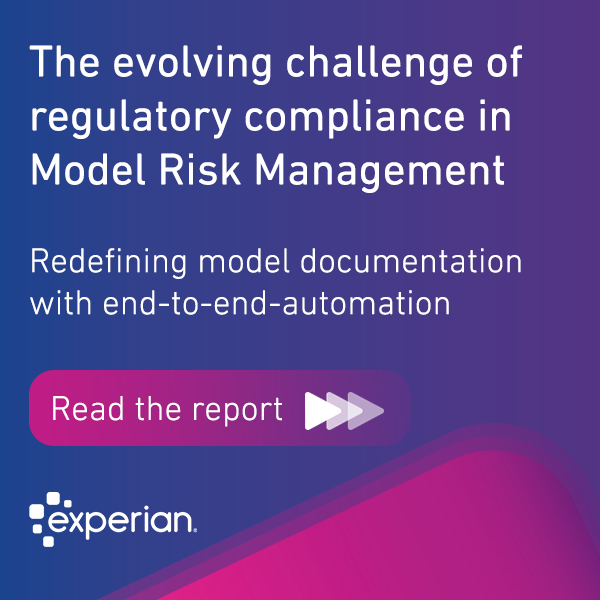Search Results for: ai

Getting the most out of your AI investment Work backward from impact - give yourself room to experiment Hire the best data talent and partner with the right provider Take a holistic approach - don't just focus on performance AI allows businesses to process sheer volumes of data and multi-tiered models with extreme speed and efficiency. But, scaling AI to meet shifting business demand can be challenging. Experian's Ascend Intelligence Services expertly partners with organizations to build custom, scalable AI and ML solutions to meet those requirements. Listen to Shri Santhanam advise on how to scale AI

Did you miss these August business headlines? We’ve compiled the top global news stories that you need to stay in-the-know on the latest hot topics and insights from our experts. Categorizing Fraud Types is the Key to Addressing Risk Security Magazine's Chris Ryan uses Experian research to break down why businesses need to first identify and understand the individual types of fraud before being in the position to address risk, especially when operating in an increasingly digital age. How To Protect Yourself Against Scammers and Deepfakes In this video, Philip Michael of Bold TV talks to David Britton, VP of Industry Solutions, about what fraud looks like in an AI-driven world, what exactly Deepfakes are, how they can be used in financial scams, and how Experian is using tools like AI and ML to fight back. Today’s Credit Decisioning: Navigating the Current Complexities The science of consumer credit decisioning is complex, writes Harry Singh, SVP of Global Decisioning, for Credit Union Times, but what has the pandemic done to further these complexities? This piece explains why lenders need to rethink existing models and processes to succeed in changing times. Experian Named Top Fraud Prevention Leader in International Analyst Report Research from KuppingerCole lists Experian as an overall leader in fraud reduction intelligence platforms. The research also recognized leadership in product, market and innovation, and across all other categories. Read about why this is important as fraud risks rise. How To Combat Fraudsters As The Digital World Grows In this piece for CEO World, David Britton, VP of Industry Solutions, writes about the relentless nature of fraud and why the goal of fraudsters never changes, and what businesses and individuals must to in the face of an ever-evolving fraud landscape in an increasingly digital world. Stay in the know with our latest research and insights:

Shri Santhanam, EVP and Global Head of Analytics and AI, talks to Ganesh Padmanabhan from Stories in AI about why he hopes the changing world of lending will lead to better financial inclusion. "The whole digital revolution in lending means that financial institutions are scrambling to make the process much more seamless, reduce time for approvals, let consumers have access to different financial products, and have innovative products like buy now pay later. But underneath it all, you have to get more nuanced and more sophisticated about the methodologies that you use for lending. And this is where AI and ML come in." Expect to hear discussions about the future of finance, how to drive impact by leveraging data analytics and AI, frameworks for setting up and institutionalizing an AI center of competence for a large organization, and how to scale data science efforts through hiring, promoting from within, and setting up the right structure and processes to make it happen. "Experian for over 100 years now has leveraged the power of data. We’ve been a very powerful data company. We’ve used that data to improve the lives of consumers and improve how businesses make decisions. Fundamentally, we’ve had a set of pioneers who before Big Data tech was introduced to the world, figured out that having a data marketplace or collecting high quality data on consumer lending will be of value, and that’s been the core of our business. That dynamic is changing. We see a lot of value migrating what we call up the stack. So from purely data to actually the decisions that are made with the data, to products and services in the data." Related content

In this episode of Insights in Action, as part of our Women Making Waves in Technology special series, Pamela Stephens, Sr. Product Manager for Global Identity & Fraud at Experian walks us through her role in product management and shares some practical career advice for women in tech. The podcast explores what it takes to drive change and innovation within a shifting fraud and identity landscape, looking at the importance of connecting with teams, laser-focussed priorities, customer-centricity and how diversity and inclusion initiatives are central to supporting women in tech. "I am a relentless customer advocate. I spend most of my days focussing on solving the most urgent problems for our clients across the Identity and Fraud landscape through our technology." Top 3 tips for remote working Being authentic is how we connect, so working remotely makes this challeneging. Schedule quick 15-minute catch-ups with colleagues - and not necessarily about work. The more you know someone, the better you work with them. Burnout is real, setting boundaries for work versus life is challenging when you're in an office, never mind when at home. Schedule breaks and proritize self-care. Stay laser-focussed and organized with your calendar - be intentional with how you schedule your calendar and ensure it aligns with priorities most important for the business and you personally Discover other stories from the Women Making Waves in Tech podcast series Access all episodes of Insights in Action on Soundcloud, Spotify, Google Podcasts

Did you miss these May business headlines? We’ve compiled the top global news stories that you need to stay in-the-know on the latest hot topics and insights from our experts. APAC businesses focus more on revenue generation than fraud prevention Disruptive Asia looks at the latest Experian research uncovering how businesses across the Asia Pacific (APAC) region are deprioritizing security and fraud prevention. The survey found that nearly one-third favor an emphasis on revenue generation, an approach that could increase the risk of an already vulnerable digital ecosystem for consumers across the region. How sophisticated security methods can help in the battle against online fraud The National Cyber Security Centre (NCSC) has removed more scams in the last 12-months than in the previous three years combined. Finextra looks at how consumer insights from Experian's latest research uncover priorities around online security. Experian, Temenos Offer Instant Prescreen, Credit Solutions Pymnts.com reports that Experian and major banking software player Temenos have integrated their offerings to create a seamless way for lenders to extend credit. The arrangement relies on what Experian calls a “prequalification” process. eSPEAKS with Chris Preimesberger and David Britton eWeeks, Chris Preimesberger interviews David Britton, the VP of Industry Solutions at Experian. They discuss the new Experian report and study, the future of biometrics, and security trends. Experian Showcases Innovation Using Artificial Intelligence AIthority covers Experian’s best-in-class digital credit risk decisioning solutions have garnered industry-wide recognition, winning two recent awards focused on application excellence in artificial intelligence. Stay in the know with our latest insights:

The surge in digital demand over the past year reinforced the deep connection between recognition, fraud prevention, and the online customer experience. As businesses transformed their operations to accommodate the rapidly growing volume of digital transactions, consumer expectations for easy, secure interactions increased at an even faster pace. And that meant less tolerance for the interruptions caused by security and risk controls. Our 5th Annual Global Identity and Fraud Report highlights these shifts and more, drawing on three waves of data collected throughout the pandemic. The business and consumer surveys took place in waves from June 2020 to January 2021 across 10 countries spanning North America, Latin America, Europe, and Asia-Pacific. The breadth of data reveals notable changes in consumer and business behavior and priorities as each navigated the crisis. One of the many heartening discoveries included the fact that 8 in 10 businesses said that they now have a customer recognition strategy in place, up 26% since the start of the pandemic. Many companies also developed digital strategies as they strove to improve their online experience and provide security and fraud prevention measures when customers needed it most. When it comes to fraud prevention, companies are continuing to invest in securing online experiences. This is an encouraging trend, especially given that we anticipate fraud attacks will increase significantly in the near term. Here are some key consumer trends from the 5th Annual Global Identity & Fraud Report: Consumer digital trends and behaviors As of January 2021, 43% of consumers plan to increase their banking and shopping transactions in the next 12 months 60% of consumers globally have used a universal mobile wallet, a +7%-pts increase since the pandemic began and highest (66%) among under 40s 55% of consumers say security is their top priority online. This has been the case for the past 5 years of our study, with privacy (23%) second. Consumer concerns for fraud 44% of consumers globally said they were most concerned about protecting credit cards and bank account details 1 in 4 consumers (only 23%) were concerned about protecting personal data e.g. date of birth, address, and SSN or equivalent 33% of consumers are worried about identity theft compared to 28% of consumers who were worried about it before the pandemic Consumer preferences are shifting towards invisible security 74% of consumers prefer the security of physical biometrics, which is most applicable to mobile devices and include facial recognition and fingerprints 72% of consumers prefer the security of PIN codes, requiring the use of two devices, each connected to the users’ account 66% of consumers prefer the security of behavioral biometrics, which is passively observed signals across browsers/ devices requiring no effort from the consumer Even as businesses prioritize the customer experience and support, our research found that they’re still sustaining pre-pandemic levels of investment in security and fraud management. Access the report here to get more consumer trends and find out what businesses are focusing their investments to improve their customer’s digital experience, including fraud prevention.

Did you miss these March business headlines? We’ve compiled the top global news stories that you need to stay in-the-know on the latest hot topics and insights from our experts. How to build consumer trust without sacrificing the experience This Forbes article explores the relationship between brand trust and customer experience using the lastest research from Experian. Read about how simple verification methods, personalization and ensuring the use of robust ethical data practices, can be key to driving consumer trust. Using AI for digital identification, fraud prevention, and increased ROI In this IOT for all article, Eric Haller, Vice President & General Manager of Identity, Fraud & DataLabs, covers how investing in AI will not only improve customer experience but also impact a company's bottom line. Digital and online trends in a post-pandemic world Nasdaq #TradeTalks Video Broadcast Series featuring Steve Wagner, Global Managing Director of Decision Analytics, covers what we should expect to see from consumers and businesses in a 2021 post-pandemic world when it comes to digital and online. How current data-driven digital identity impacts businesses and consumers 60 percent of consumers are using a universal mobile wallet to make digital payments according to Experian's latest research. Eric Haller, Vice President & General Manager of Identity, Fraud & DataLabs, talks to CNP about how digital identity solutions that use AI and ML will reduce fraud and improve customer experience when it comes to digital transactions. The sophisticated customer and the need for adaption This Q&A in the Digital Journal with Donna DePasquale, Vice President & General Manager of Global Decisioning, looks at how businesses should respond to consumers seeking a better online experience. Stay in the know with our latest insights:

Experian is honored to be recognized as a winner of the Artificial Intelligence AI Excellence Award by Business Intelligence Group. Experian was recognized for its credit and collections decisioning solution, Experian Decisioning, which features intelligent agent-customer assist that processes complex, regulated, and subjective interactions with customers, revolutionizing how they digitally interact, on their terms, with lenders. This AI virtual assistant offers customers 24/7 access to support from their credit provider - on a financially sensitive transaction such as collections. We embedded over 30 years of collections knowledge and experience delivered to major clients across the globe into a credit risk decision management solution that delivers this domain expertise, data, analytics, decisioning, and workflow to clients of all sizes via cloud technology. Harnessing the power of AI has enabled lenders to easily connect with customers on their terms in a fair and transparent way, and to recover losses in an operationally efficient way but also improve customer satisfaction. When’s the last time you heard a customer share a positive story about collections? This digital self-service channel allows customers to engage with a lender on their terms and allows the lender to fulfill key objectives for quickly recovering losses, using the company’s strategic parameters for segmentation and treatment paths. The intelligent agent customer-assist feature within Experian Decisioning continuously learns which distinguishes it from the traditional decision-tree structure of a chatbot. It remembers interactions and learns from them, has short-term and long-term conversation goals, and recognizes small talk. It treats customers fairly and transparently. The result feels more empathetic and allows for an always-on and real-time consumer interaction. It can also offer a future-forward benefit to lenders, by allowing their employees to strategically focus on other areas of the business, potentially increasing the capacity for more credit products and services innovation. This Business Intelligence Group awards program sets out to recognize those organizations, products and people who bring Artificial Intelligence (AI) to life and apply it to solve real problems. Related stories: Going the last mile: Improving the End-to-End Digital Customer Journey Technology today: Focus on innovation drives award-winning, AI-powered consumer lending Podcast: Driving product vision with the customer front and center, a software architect’s view

Given market dynamics, technology today is an important topic for businesses to track — whether beginning a technology transformation journey or looking to continuously improve by understanding the latest advancements available — including AI-powered consumer lending. With innovation at the forefront of practices, our experts help power important topics around this subject — and fuel breakthrough technologies. Recently, this focus on innovation was acknowledged, with Ascend Intelligence Services™, winning both honors from The CIO 100 Awards and The FinTech Breakthrough Awards, premiere and notable programs that recognize breakthrough technology worldwide. ML technology helps drive customer satisfaction and increased bookings The CIO 100 Awards recognized Atlas Credit, a midsized lender headquartered in Texas for their use of the Experian Ascend Intelligence Platform. The platform enabled them to double loan application acceptance rates while reducing credit losses by up to 20 percent. Atlas Credit uses the tools and data to make instant decisions, resulting in improved customer satisfaction and higher booking rates. Using Ascend Intelligence Services, Experian data scientists rapidly built a machine learning (ML) custom credit risk model, optimized a decision strategy, and deployed the model in production, reducing time to impact by six months. “Winners are chosen by a team of external judges, many of them former CIOs, on their use of leading-edge IT practices that produce measurable results. The award is an acknowledged mark of enterprise excellence. This year's honorees exemplify what it means to deliver business value through the innovative use of technology. This elite group is creating competitive advantage in their organizations, improving business processes, enabling growth and improving relationships with customers," according to CIO 100 2021 winners. The CIO 100 awards are presented by IDG's CIO — the executive-level IT media brand providing insight into business technology leadership, each year, CIO recognizes the premier organizations and executives driving IT innovation with these prestigious awards. Honorees are inspiring examples of how IT leadership, business partnerships, and customer engagement are reshaping the future. Atlas Credit was the recipient of the Optimal Loan Underwriting with Machine Learning for Underserved Consumers project. Better results, delivered faster to help power FinTech evolution Experian's Ascend Intelligence Services was also selected as a winner of The FinTech Breakthrough Honors, which recognizes Standout FinTech Companies and Solutions in 2021. Ascend Intelligence Services was recognized as the FinTech Breakthrough Award winner in the Consumer Lending Innovation Award category. The FinTech Breakthrough Awards is the premier awards program founded to recognize the FinTech innovators, leaders, and visionaries from around the world in a range of categories, including Digital Banking, Personal Finance, Lending, Payments, Wealth Management, Investments, RegTech, InsurTech, and many more. The 2021 FinTech Breakthrough Award program attracted more than 3,850 nominations from across the globe. "This past year has been unlike any time period ever seen before for FinTech growth and disruption, with FinTechs maturing to become respected, global players throughout the financial services value chain," said James Johnson, Managing Director, FinTech Breakthrough. "FinTech is a digital force that has clearly entered a new phase of its evolution, moving out of niche use cases to operate at scale, and we are thrilled to recognize the 'breakthrough' FinTech innovators in this market evolution for our fifth annual FinTech Breakthrough Awards program." Ascend Intelligence Services is a fully managed analytics service delivered digitally by Experian data scientists. It helps lenders leverage advanced technology, utilizing AI to deliver better results up to 5x faster, accelerating time-to-market all while allowing them to make sound business decisions. Related stories: Insights in Action Podcast: Identifying the core capabilities your business needs to get MLOps right Fair and explainable artificial intelligence is accelerating industry transformation Going the last mile: Improving the End-to-End Digital Customer Journey

Artificial Intelligence (AI) offers people and companies many advantages, and we interact with it every day. From the technology we use to do simple things like heating and cooling our homes, to more advanced tools that map potential disease outbreaks across the globe. AI is also being used more and more in the financial services sector – from matching new customers with the right loan and terms to assisting with transactions in real-time online. In a recent study, we found two-thirds of businesses surveyed globally are using AI to help manage their businesses today. More businesses are keen to use AI but are challenged to fulfill requirements for decision explainability – a must-do for ensuring consumers are treated fairly. The history of AI AI stems from the realization of the potential of computation. The father of theoretical computer science and AI, Alan Turing, introduced a theoretical mathematical model of computation – aptly named the Turing Machine – in 1936. He described this machine as being capable of computing anything computable. By 1950, his work posed the question “Can machines think?” He introduced the Turing Test, still in use today to subjectively evaluate whether a machine is intelligent based on its ability to have a conversation. Six years later, in 1956, prominent computer scientists proposed the famous Dartmouth Summer Project. Advanced concepts were introduced and discussed and the term "artificial intelligence" was first coined. Over the following two decades, AI flourished. Computers became not only faster, cheaper, and more accessible, but they were progressively able to store more information. Meanwhile, machine learning algorithms continued to improve, getting the interest of experts in different fields and industries and taking the realm of artificial intelligence to a tipping point in the early ’80s. Back then, John Hopfield and David Rumelhart popularized “deep learning” techniques which allowed computers to learn from experience. Meanwhile, Edward Feigenbaum introduced expert systems which mimicked the decision-making process of a human expert, allowing the program to ask an expert in a field how to respond in a given situation and to learn from it. How can AI benefit both businesses and consumers? Following these early milestones, the advanced analytics sector has experienced explosive growth – with AI impacting many aspects of our lives today. While most people have come to realize that AI can be beneficial, even since the early days, there have been many different views on how those involved in programming the algorithms must take the necessary steps to prevent AI from reinforcing stereotypes, widening wealth and educational gaps, or providing incorrect answers at critical junctures such as in a medical setting. As an example of what not to do: a famous language model was trained using 8 million pages sourced directly from the web. So, implicit in this model are the preconceptions and biases included in its training data. In this case, it led to a model with a trend towards greater male bias in more senior, higher-paying jobs. How to determine fairness in AI models So how can we ensure that the use of AI does not reinforce societal racism, sexism, or other stereotypes? That leads us to define fairness. It’s the impartial and just treatment of people without favoritism or discrimination; when no unjustified distinctions occur based on groups, classes, or other categories to which they are perceived to belong. But, within the world of AI, there are varying approaches to fairness associated with different metrics to evaluate and adopt this sought-after algorithmic fairness. Any solution requires defining dimensions of fairness, but realistically, it’s extremely hard to capture all these very sensitive variables and risky to store and process them. To truly determine if an AI system is fair requires an enormous amount of data and expertise. Additionally, promoting fairness requires an approach across the entire data science life cycle and modeling life cycle. All areas must be considered from the approach to data collection to ongoing evaluation of decisions. And, while fairness in AI is not ‘once and done’ or easily solved, the good news is that it is an area of great focus for regulators, academics, and data and analytics industry experts, like our peers at Experian. The growing importance of transparency and explainability Models generally compute calculations that are complex and involve more dimensions than we can directly comprehend. Given this processing step from model-input-to-model-output is unclear, it leads to questions around how a model has come to a decision. Importantly, how can one be sure that the model is behaving as expected? There are different ways to address explainability. One includes an understanding of how different inputs of a model affect its outputs. Shapley values, introduced by Nobel prize winner Lloyd Shapely, consider an aggregate of marginal contributions for all possible combinations. Another technique involves explaining the behavior of a decision by identifying model constants verse variables to extract what drove a decision and how. Yet another method uses counterfactual explanations, identifying the precise boundary where a decision changes. This method is easy to communicate since it involves statements such as if X had not occurred, Y would not have happened. As in the case of fairness, there’s an on-going dialogue around explainability, underpinned by current and yet to emerge new techniques that maintain model accuracy and improve explainability. Artificial intelligence is past its infancy stage. It’s already had an impact on our daily lives and is becoming increasingly ubiquitous. Fairness, along with a transparent and explainable approach are key ingredients to help this field continue its transition to maturity.

The world is still grappling with the mental, emotional, and financial toll of the Covid-19 pandemic but there are clear signs of hope and resolution ahead. Consumer concerns about their personal finances have started to ease for the first time since June 2020. And there’s a groundswell of opportunity for businesses to serve the growing ranks of “connected customers”—putting the consumer truly at the heart of the relationship. Download Global Insights Report – January/February 2021 issue Key insights: 60% of consumers are using a universal mobile wallet - for online and/or in-person contactless transactions Top 2 activities among consumers online are personal banking (58%) and ordering groceries and takeout food (56%) 90% of businesses have a strategy in place related to the digital customer journey; 47% of businesses put this strategy into place since Covid-19 41% of businesses intend to use AI to acquire and onboard new customers 55% of consumers say security is the most important factor in their digital experience – this is highest in the UK (65%), followed by Japan (64%) Fraud is the biggest challenge among businesses; 55% of businesses plan to increase fraud management budgets In this report, we continue our examination of consumer behavior and business strategy throughout the pandemic. For our third wave of insights, we surveyed 3,000 consumers and 900 businesses in January 2021. Our respondents span 10 countries, including Australia, Brazil, France, Germany, India, Japan, Singapore, Spain, the United Kingdom, and the United States. Over the past 12 months, we’ve observed consumer demand for the digital channel increase at a rate that few could have predicted. The most recent survey shows that these trends are persisting. Looking ahead, we expect that as people get more comfortable with the security and convenience of the digital channel, it will become the preferred—if not permanent—way to bank and shop. Part of what’s driving the continued demand: Positive digital experiences. Most consumers report they’ve been satisfied with their online transactions, especially when they secure and their financial information is protected. This is remarkable, given the challenges businesses faced to meet online demand while simultaneously adapting their employee and customer operations to the crisis. Businesses rose to the occasion and there’s opportunity ahead. Our latest report reveals that consumer expectations for digital experiences continue to rise. For example, even as consumers enjoy the ease of online banking and shopping, security is top-of-mind. In response, businesses are renewing their focus on preventing and mitigating account takeover fraud, transactional fraud, and digital takeaway fraud (e.g. buy online and pick up in-store). And they’re looking for solutions they can use throughout the digital customer journey, not just account opening. Consumers are also looking for greater customer support across digital channels. For example, when a customer is engaging with a business digitally, access to customer service is essential. It’s also an area where many businesses are falling short. However, businesses have made redefining the customer journey a priority and they're investing in capabilities, such as artificial intelligence and automation, to deliver on customer expectations. Consumers and businesses have embraced the digital channel— and the promise it offers is only growing. Now as we move toward a new, post-pandemic era, organizations that re-imagine the customer journey and create digital experiences that place customers at the center stand to win. find out what businesses are using to help improve the customer journey across digital channels, as they prepare for post-Covid customer engagements.

Get the latest from our global experts with these top December headlines, including meeting the demand for digital, increasing consumer expectations, women leading artificial intelligence, and protecting against fraudsters over the holiday shopping season. Investment priorities to meet consumer demand for digital banking In this BAI Banking article, Chris Fletcher, SVP Decision Management & Cloud Services, explores the investment required of financial institutions to transform their use of data and analytics and deliver on credit risk strategies. What’s the proper path for better payments? In context to consumers’ digital expectations post-Covid-19, Progressive Grocer considers the future of payments in food retail and beyond – with contactless payment options already rolling out at a large drug store chain. Wisdom from the women leading the AI industry, with Laura Stoddart of Experian Authority Magazine speaks with Laura Stoddart, Data Scientist, about her career path, her experiences working on ethical AI and using emerging datasets to evaluate risk as well as her thoughts on the future of this industry. #TradeTalks: Increasing consumer demands and expectations Steve Wagner, Global Managing Director of Decision Analytics, joins Nasdaq’s Jill Malandrino to discuss recent research findings on increasing consumer demands and digital expectations, and ongoing considerations for a post-Covid-19 world. A holiday season like no other: What to know to guard your company against fraud Itay Levy, Forbes Councils member and CEO and Co-Founder of Identiq, provides his perspective on the increased preference for online shopping and the need to strike the right balance between customer experience and efforts to mitigate fraud. Stay in the know with our latest insights:




